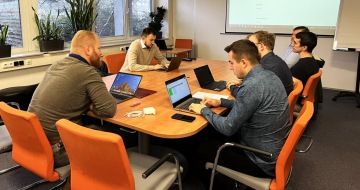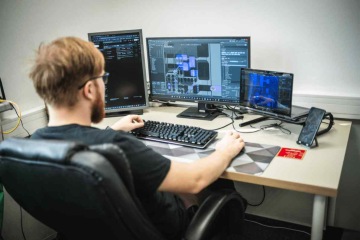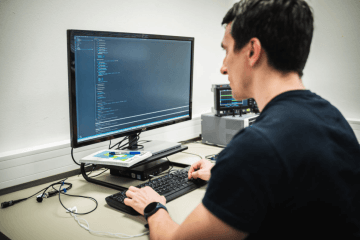About us > ASN News
Smart manufacturing
The path to more sustainable electronics with ASN Plus
The electronics industry is experiencing significant growth and the global revenue of this market is expected to reach a staggering $1.2 trillion by 2028. However, this growth also brings with it a number of challenges, such as complex supply chains, intense competition, shortened product life cycles and the constant introduction of new products to the market. To succeed in this challenging environment, companies need to focus on sustainability and harness the potential of smart manufacturing.
Sustainability is becoming a key priority not only in terms of meeting regulatory requirements, but also in light of changing consumer attitudes. Increasingly, they are favouring organic products, even if they have a higher price tag. This requires a more holistic approach to product design and manufacturing that goes beyond immediate profits and addresses the long-term environmental impact of the product and its materials.
Government policies and enforcement will be necessary to truly accelerate this shift. Several countries have already taken concrete steps in this direction. France, for example, is now mandating manufacturers and importers to include recyclability and end-of-life sorting information on electrical appliances and batteries.
In this context, ASN Plus can be a reliable partner for companies in the electronics industry, offering innovative solutions for electronics development with an emphasis on sustainability and efficiency.
Collaboration as the key to sustainability
Smart manufacturing originally focused only on what happens inside the factory, but to achieve environmental goals, broader and more complex organisational and technological barriers need to be addressed. It is no longer enough to simply pass ideas to the manufacturing department, but close collaboration between R&D, product development and manufacturing teams is required to leverage their collective strengths for better decision making.
Advanced cloud technologies such as the Nexus digital reality platform enable digital threads to connect across the entire product lifecycle, including design, engineering, manufacturing and quality assurance.

Flexibility instead of disrupting existing processes
Software is the key to increasing efficiency, reducing waste and facilitating the transition to sustainable materials and manufacturing processes. Advanced digital twins now allow engineers to create models of electronic systems that accurately reflect real-world performance criteria and simulate how the end product is affected by changes in materials and manufacturing processes.
This principle applies throughout the value chain. Semiconductor manufacturing is moving forward with virtual manufacturing, designing 3D printed machine parts that optimize processes for next-generation silicon, and more efficient heat sinks for power electronic components. These advances are accelerated by seamless collaboration between engineering and manufacturing disciplines, without the time and material cost losses associated with multiple iterations of physical prototypes.
The move to more complex system modelling also supports product innovation. It gives engineers the freedom to experiment with new, sustainable alternatives to traditional materials and more efficient designs, while ensuring that performance criteria such as durability, conductivity and heat resistance are still met, as well as regulatory requirements such as RoHS (Restriction of Hazardous Substances), which controls the use of substances such as arsenic that are still used in semiconductor manufacturing.
For data-driven sustainability solutions to be effective in the rapidly evolving electronics industry, scalability and flexibility are absolutely essential. Manufacturing 'tech stacks' must be designed with this in mind, and ease of use and straightforward setup processes must be prioritised to encourage widespread adoption.
Interoperability and modularity are also essential. This flexibility ensures that applications can be built to address the specific needs of each of the many stakeholders while linking them to all the necessary data. No one can afford to start from scratch, so a phased approach is essential to integrate sustainability practices into existing production processes without disrupting productivity.
ASN Plus recognizes these challenges and its solutions are designed to maximize flexibility and minimize disruption to customers' established processes. The modular architecture allows the solution to be tailored to the needs of a specific business while ensuring seamless integration with existing systems. Emphasis is placed on intuitive user interfaces and automation of routine tasks to make adoption of new tools and processes as easy as possible for all stakeholders from developers to production to management.
Open systems as a prerequisite
The complexity of supply chains remains a challenge for sustainability as it involves many suppliers and components of different origins involved in the production of electronic devices, from raw materials to component manufacturing, final assembly and testing. This makes it difficult to track or analyse the carbon dioxide emissions or energy consumption associated with all the components of a product.
As leading organizations develop precision digital twins and further integrate digital supply chains, it will be possible to achieve the higher levels of visibility and automation that are necessary for today's innovations to significantly improve sustainability while applying automation to maintain the operational efficiencies needed to sustain the business.
The future e-industry will depend on technologies that prioritise connectivity and open data sharing, both within organisations and across their supply chains. Open digital reality platforms are connecting data silos and enabling OEMs to influence the trajectory of their industries, and quality management systems are playing an increasingly important role in supply chain sustainability management.
While no one expects the smart factory to run itself, managers are now open to technological advances that were until recently off the table. Sustainability is no longer just about risk mitigation, but those who align their digital strategies with sustainability-focused design and manufacturing will gain a competitive advantage - positively impacting stakeholders and financial results while meeting the growing demand for innovative products and sustainable brand value.
Added value of cooperation with ASN Plus
ASN Plus focuses on the development of customized electronics, embedded systems, firmware and software. Thanks to its own know-how, individual approach and flexibility, it can respond flexibly to client requirements, whether it is a one-off development of a new product or a long-term cooperation.
One of the key added values of working with ASN Plus is product innovation. Thanks to its extensive experience and deep industry knowledge, the company can design and implement solutions that push the boundaries of what is possible and give customers a competitive advantage. With ASN Plus, you can be the first to market with a disruptive electronic innovation and set trends in your industry.
Simplifying processes for customers is another major benefit. You don't have to worry about finding suppliers for individual components and solving sub-problems, ASN Plus will provide everything you need. This removes much of the administrative burden and allows the customer to concentrate on their core business. ASN Plus also provides support in setting up the business model and go-to-market strategy to make the new product launch as successful as possible.
Last but not least, ASN Plus becomes a true partner of the customer, helping them to define and fulfil their vision. Together, they plan and implement the different phases of development and look for ways to address any concerns and obstacles. The transparent business model and open communication create a relationship based on trust and a shared interest in the success of the project.
Individuality and customization are the cornerstones of ASN Plus' approach to customers. Each project is unique and requires specific solutions. Therefore, ASN Plus places great emphasis on a detailed analysis of the client's needs and requirements to ensure that the proposed solution best fits their situation and goals. At the same time, ASN Plus can be as flexible as possible and adapt to changing conditions during the course of a project.
The ability to innovate, an experienced team, effective communication, agility and customization - all of this makes ASN Plus a reliable partner for challenging electronics development projects. Satisfied customers particularly appreciate the speed of delivery, the high quality of the final product and the professional approach throughout the cooperation.



Conclusion
Sustainability is becoming imperative for survival and success in today's electronics industry. Increasing regulatory pressure, changing customer preferences and the challenges of complex supply chains are forcing companies to find new ways to reduce their environmental impact while remaining competitive.
Smart manufacturing, based on the principles of collaboration, flexibility and openness, is an effective tool to achieve this goal. It enables them to optimise processes, reduce waste, introduce sustainable materials and innovate products to meet the highest standards of performance and environmental friendliness.
The key success factor in this context is choosing the right partner with the right knowledge, technology and shared vision of a sustainable future. ASN Plus offers comprehensive services for electronics development with an emphasis on innovation, efficiency and a personalised approach to the customer. With in-house know-how, a top-notch team of experts and flexible, tailor-made solutions, it can accelerate the market launch of a new product and give it a competitive advantage.
Take a look at what we can offer you...
Become one of our trusted clients




Take your product to the next level!
Book a consultation with our specialists and discover just how many technological possibilities are within your reach. We’ll be in touch soon to explore the best way to work together.
